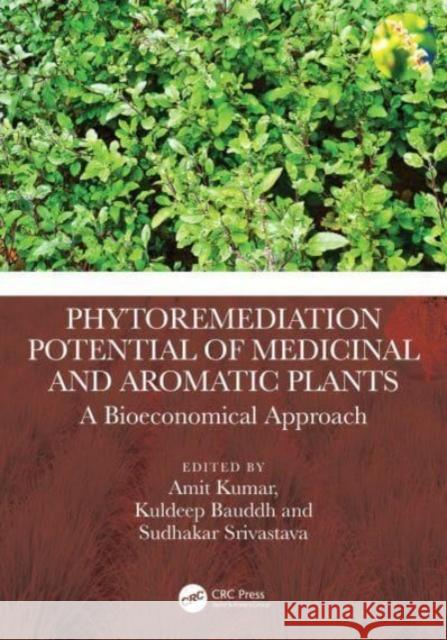Phytoremediation Potential of Medicinal and Aromatic Plants » książka



Phytoremediation Potential of Medicinal and Aromatic Plants
ISBN-13: 9781032269108 / Twarda / 2023 / 198 str.
The book brings about a critical overview of the prospects of utilizing medicinal and aromatic plants in phytoremediation including their utility, economical benefits and human safety issues.
1. Phytoremediation of heavy metals: A Review 2. Biogenic nanoparticles enhance the phytoremediation potential of medicinal and aromatic plants 3. Heavy Metal Accumulation Potential of Medicinal plants: Phytoremediation perspective 4. Role of microbial nanotechnology in medicinal plants growth and phytoremediation 5. Phytoremediation Potential of Ocimum sanctum: A Sustainable Approach for Remediation of Heavy Metals 6. Understanding the potential of Cymbopogon species in remediation of heavy metal contaminated soils 7. An overview on aspects, possibilities, remediation and fortification of contaminants via medicinal and aromatic plants 8. Phytoremediation efficiency improvement: Role of nanoparticles and need for optimizations 9. Role of Aromatic and medicinal plants in phytoremediation of heavy metal pollutants 10. Sustainability of Aromatic Plants In Remediation of Cadmium From Contaminated Sites 11. Assessment of heavy metals and their induced toxicity in medicinal plants: a public health concern 12. Medicinal Plants and Their Role in Mitigation of Arsenic Induced Toxicity 13. Phytoremediation of Arsenic: An Overview
Amit Kumar is currently working as a Research Associate at CSIR-National Botanical Research Institute. He is also worked as a National Post-Doctoral Fellow in Department of Botany, University of Lucknow, Lucknow, India. He received his Ph.D. in Environmental Science (2015) from Babasaheb Bhimrao Ambedkar University, Lucknow, Uttar Pradesh, India. Dr. Kumar is engaged in various aspects of metal/ metalloid phytoremediation, biochemical and molecular approaches with a special emphasis on reducing heavy metal accumulation. He is working on mitigation of arsenic in crop plants and green leafy vegetables with enhancing grain yield through biogenic nanoparticles and elemental based formulation for arsenic affected areas. He has published 36 research papers with total impact factor 146.72, H-index 23 and total citation 2320. He has also published many national and international book chapters and magazine articles. He has presented a paper in international conference at Gdańsk, Poland in 2015. He is life member of several societies as well as non-governmental organizations. He has also served as a reviewer for various national and international journals. He has been conferred several Awards for his contribution, including Protsahan Award-2021; Awsar Award-2020 and Young Scientist Award-2018.
Kuldeep Bauddh is currently an Assistant Professor at the Department of Environmental Sciences, Central University of Jharkhand, Ranchi, India. He received his Ph.D. in Environmental Science from the Babasaheb Bhimrao Ambedkar University, Lucknow, UP, India in 2014. Dr. Bauddh is currently engaged in teaching the thrust areas of environmental sciences like Environmental Pollution and Management, Environmental Chemistry, Environmental Toxicology, Soil Science and Hazardous Waste Management. His main research areas are phytoremediation, restoration of contaminated sites, and slow release fertilizers. He has published three Books (Edited) two with Elsevier on ‘Phytomanagement of Polluted Sites’ and Phytorestoration of Abandoned Mining and Oil Drilling Sites (In press), three with Springer on ‘Ecological and Practical Applications for Sustainable Agriculture’ (In Press), ‘Phytoremediation Potential of Bioenergy Plants, and ‘Algae and Environmental Sustainability". He published 32 research papers in national and international journals, 22 book chapters and 6 popular articles in magazines. Dr. Bauddh is reviewer of Research Journals like Ecotoxicology and Environmental Safety, Chemosphere, Ecological Engineering, International Journal of Phytoremediation, Acta Physiologiae Platarum, Climate Change and Environmental Sustainability and Environmental Sustainability.
Sudhakar Srivastava is presently working as an Assistant Professor at the Institute of Environment and Sustainable Development (IESD), Banaras Hindu University (BHU). He completed his M.Sc. and Ph.D. in Botany at the University of Lucknow. He also served as a Scientific Officer at Bhabha Atomic Research Centre (BARC), Mumbai from 2009 to 2014. He has more than seventeen years of research experience in the field of plant-metal interactions, with a major focus on arsenic stress responses in plants. He has published 75 research articles and 30 review and letter articles in high-impact international and national journals. He has also received several awards for his contributions, including a Young Scientist Award from the National Academy of Sciences, India (NASI), Allahabad in 2011, Young Scientist Award from Uttar Pradesh Council of Science & Technology (UPCST) in 2013-2014, and Young Scientist Award from the Science and Engineering Research Board (SERB) in 2015. Dr. Srivastava is also an Associate of the National Academy of Agricultural Sciences (NAAS) and a life member of several societies as well as non-governmental organizations and serves as an Associate Editor for two respected international journals: Acta Physiologiae Plantarum and Frontiers in Ecology and Evolution.
1997-2026 DolnySlask.com Agencja Internetowa
KrainaKsiazek.PL - Księgarnia Internetowa









